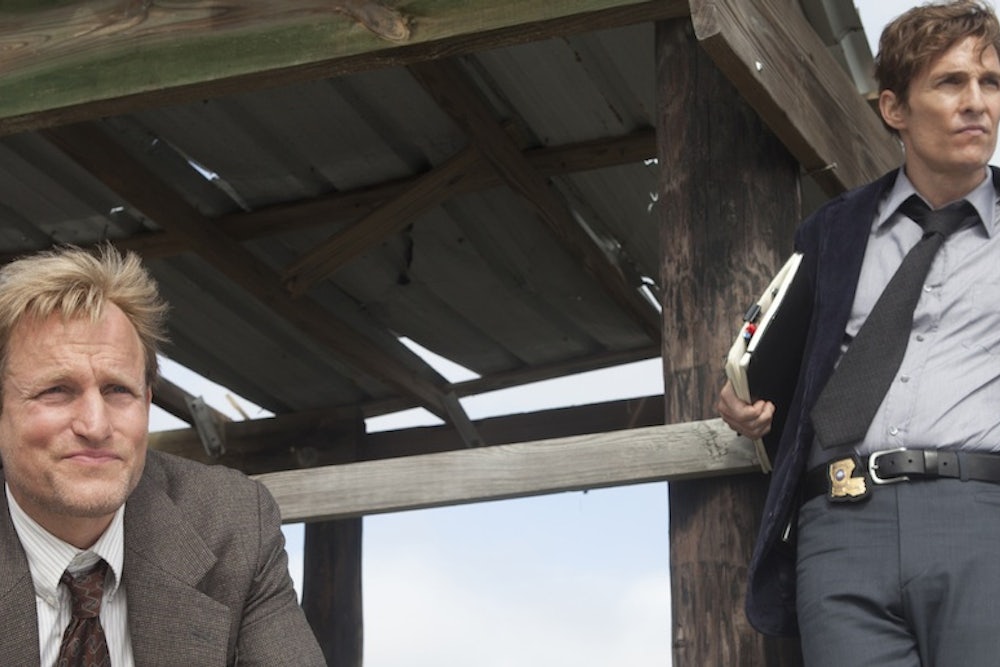"True Detective" is five episodes through its eight episode run, and although the show has received excellent reviews, several critics have taken issue with Matthew McConaughey's character, Rust Cohle. (Is there a more manly name imaginable?) Cohle and his partner, superbly played by Woody Harrelson, are investigating a bizarre and gruesome murder, and also facing questioning from two other detectives, 17 years later, for reasons that remain unclear. The show thus largely consists of flashbacks, with occasional scenes of the two protagonists reflecting back on what occurred.
I think the show is the most compelling and striking thing I have seen on television since "The Wire" and "The Sopranos" stopped airing new episodes. The direction is startlingly good—each episode has a few shots that take the viewer's breath away—and outside of David Fincher's best movies, I can't recall any show or movie so creepily atmospheric and so filled with foreboding. Cary Joji Fukunaga, the director, uses music to build tension with the skill of Christopher Nolan at his best. Last Sunday's episode, meanwhile, ended with a tracking shot that must be seen to be believed. (James Poniewozik has a good rundown here.) My favorite shot, from an earlier episode, is from inside the detectives's car as a group of men run towards them with unclear intentions. It turns out to be for a completely banal reason, but far from being a throw-away, the image sticks in the viewer's mind.
But back to the criticisms. The most common one appears to be that McConaughey's character spouts mouthfuls of bad dialogue. Rust is clearly on the edge—he has lost a daughter, and his police career has been filled with hardship—and consequently he is borderline insane, prone to ruminating on existence and faith and, yes, the meaning of life. These long monologues, which take place both in the flashbacks and in scenes from the present day, have received some harsh words from a few critics. Here is the great Andy Greenwald, in Grantland:
I’m starting to wish Hart were able to hit back at Cohle with something other than jokes. It’s one thing to set Rust Cohle apart from the rest of the world: He’s done stuff that can’t be undone, seen things that shouldn’t be seen. (The worst of those things, we learn, involved duct tape, a knife, and a mirror.) But with Hart in free fall, it’s clear that writer Nic Pizzolatto doesn’t think Cohle is loopy—he thinks he’s awesome. I’d prefer a show that offered more than half-hearted resistance to Rust Cohle’s whiskey-courageous speechifying. But more and more it’s clear that wherever this show is heading, he’s the one in the driver’s seat.
And here is Mike Hale in The New York Times:
The series reveals itself as a languid character study and a vehicle for long-winded exchanges about religion and responsibility that are writerly in the worst way. Mr. McConaughey is saddled with most of Mr. Pizzolatto’s more egregious dialogue, and it’s to his credit that he can maintain Cohle’s credibility while delivering lines like “There’s a weight, and it’s got its fish hooks in your heart and your soul,” and “There was other times I thought I was mainlining the secret truth of the universe.”
These critiques share the assumption that the viewer is meant to view McConaughey's rants as profound. I think this misreads the show's intentions.
For starters, numerous scenes in the early episodes were clearly meant to be funny, as they would cut from McConaughey's speeches to an annoyed Harrelson (who is quite good as the straight(er) man). It seemed quite obvious that we were meant to empathize with someone who is forced to listen to a crazy partner as they drive around interviewing witnesses. Certainly, McConaughey is a better cop than Harrelson, and the show appears to share his cynical view of the universe. But he is also insane, right down to his creepy carving of beer cans. (The idea that a somewhat crazy person can also occasionally see things from a different perspective, thus enabling him to get at truths that others are missing, was used to great effect by Richard Yates in his brilliant novel Revolutionary Road.)
Secondly, I do not know where the show is going, but as Greenwald himself recognizes, "True Detective" is starting to hint at the possibility that we may be listening to unreliable narrators. Quite apart from anything else, McConaughey can't really even be trusted to tell the story we are watching. It thus seems highly unlikely that we are supposed to view his strange ramblings as deep insights into the human condition. Try this, for example:
I have seen the finale of thousands of lives man. Young, old, each one was so sure of their realness, that their sensory experience constituted a unique individual; purpose, meaning, so certain that they were more than just a biological puppet. Truth wills out, everybody sees once the strings are cut off all down.
I suppose I could be wrong, and that the minds behind the show really think this is deep stuff. Or that this—“Mankind should walk hand-in-hand to extinction, one last midnight, brothers and sisters opting out of a raw deal"—acutely captures the human condition. But more likely, they intended to create a character who is both smart and crazy, often wise and frequently disturbed. They have succeeded.
